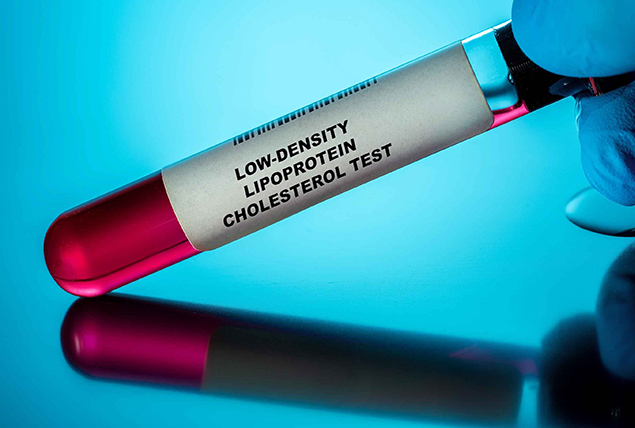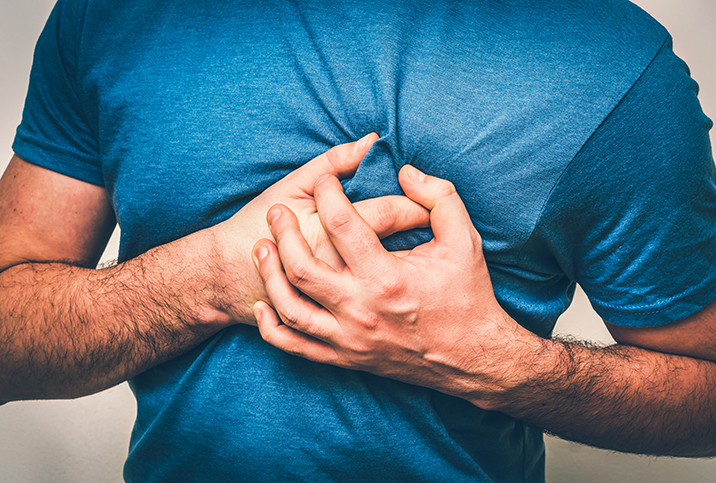A High Cholesterol Level Often Goes Undetected

You likely know a little something about cholesterol, a fatty substance found in blood. High cholesterol is associated with heart disease and can lead to blocked arteries caused by the buildup of sticky cholesterol on the inside of the arteries and veins. That buildup can lead to a heart attack or stroke.
Unfortunately, a high cholesterol level doesn't come with various easy-to-diagnose symptoms that indicate an obvious diagnosis. At least not before it does significant damage to your health.
It's easy to wonder what cholesterol level requires medication since pharmacological options are often considered first. But it's not that simple with cholesterol. Lifestyle changes are usually the first step.
Taking charge of your heart health is vital throughout your life, as is being proactive about cholesterol screenings. As a rule of thumb, men need to begin testing in their mid-30s and women should test by the time they're 45 years old. Whatever your age, if you have diabetes, high blood pressure or you've had a stroke, get tested now.
Symptoms of high cholesterol
High blood cholesterol alone typically doesn't cause symptoms, which makes it a dangerous risk factor for heart disease. That said, not having symptoms is a good thing. If your cholesterol levels have been high for a long while, you may begin to notice symptoms that warrant a trip to the doctor. But by that time, you have few options to undo the damage.
"When cholesterol is high for an extended period of time, some of it becomes attached to the blood vessels in the body and can build up to cause blockages in the blood vessels," said Teresa Lovins, M.D., a family medicine specialist in Columbia, Indiana, and an American Academy of Family Physicians (AAFP) board member. "There are also some changes in the skin called xanthomas, which can develop around the eyes and other areas. Xanthomas are yellow fatty deposits in the skin and they're related to having high cholesterol in your bloodstream."
Aside from the xanthomas you can see, you're unlikely to notice any blockages in your blood vessels before a serious event occurs—unless you're undergoing testing with a doctor.
"High cholesterol can cause narrowing of the arteries, which can result in chest pain, heart attacks and strokes," said Kisha Davis, M.D., M.P.H., a family physician in Gaithersburg, Maryland, and an AAFP board member. "There could be no signs of high cholesterol until one of these events."
Since symptoms rarely manifest prior to a health event, you need to be aware of your family health history.
"Likely, if your parents had issues with cholesterol, heart disease or strokes, you're also at risk and should have your cholesterol numbers checked," Lovins said.
How to diagnose high cholesterol
It's easy to get tested for high cholesterol. Contact your primary care physician and let them know you'd like a checkup and bloodwork, including a cholesterol test.
"The more accurate numbers are evaluated when you haven't eaten for 10 to 12 hours before the blood is drawn," Lovins said. "If you can't schedule an appointment for a time when you can fast for that long, you shouldn't skip or delay the test. We sometimes suggest as a screen that you get your cholesterol levels drawn even if you're not fasting. If the results are high, your physician may suggest some lifestyle changes and recheck the numbers in the future in a fasting state."
Physicians can use fasting and nonfasting cholesterol levels in their assessment of your risk.
Blood tests typically reveal results for four different factors:
- Total cholesterol
- High-density lipoproteins (HDL cholesterol), considered "good" cholesterol
- Low-density lipoproteins (LDL cholesterol), considered "bad" cholesterol
- Triglycerides, other types of fat found in the bloodstream
Your doctor will consider each of these factors to determine your overall risk.
Total cholesterol levels, measured in milligrams per deciliter (mg/dL) break down into high cholesterol, borderline high cholesterol, and normal or healthy cholesterol, as follows:
- High cholesterol: at or above 240 mg/dL
- Borderline high cholesterol: 200-239 mg/dL
- Normal cholesterol: less than 200 mg/dL
Ideal levels of HDL, LDL, and triglycerides are as follows:
- LDL cholesterol: under 130 mg/dL
- HDL cholesterol: over 60 mg/dL
- Triglycerides: under 150 mg/dL
Heart disease risk can be affected by the ratio of HDL to LDL, and it's essential to have your physician help you understand your numbers and discuss possible treatments. For instance, someone with a total cholesterol of about 200 but with a very low HDL number and a high LDL number may have a higher risk for heart disease than someone with different ratios. Someone with total cholesterol in the "borderline" range but with a high HDL and low LDL may not be at such high risk.
Your healthcare provider will help you assess the role of disease co-factors and ideal treatments.
"You should discuss your individual condition with your doctor, especially as people with diabetes, for example, will have more aggressive cholesterol goals," Davis said. "This is because some diseases—like diabetes or liver disease—can negatively impact cholesterol levels and thus increase the risk of heart disease."
Seeking help after a high cholesterol diagnosis
The first expert you should turn to after hearing about a high cholesterol diagnosis is your primary care physician. Just because you have high cholesterol doesn't mean you have any more serious diseases, but it does place you at a higher risk for heart disease and stroke.
So what cholesterol level requires medication? Most doctors will want you to make changes to your lifestyle rather than prescribe medications. Of course, this all depends on how high your cholesterol is and whether you have any other heart disease risk factors, such as type 2 diabetes.
"Anyone with high cholesterol should start by improving their diet. This means reducing the intake of saturated and trans fats, like fried and pre-packaged foods," Davis said. "Eating more foods rich in omega-3 fatty acids, such as salmon, almonds and walnuts, is also a good step."
She added that stopping smoking won't directly impact cholesterol, but because smoking increases the risk of heart attack and stroke, it's an important step to take if your cholesterol numbers are high.
Also, don't overlook the role of exercise.
"Just 30 minutes a day, most days of the week will help," Davis said.
This can be a moderate form of exercise like walking, swimming or riding a bike.
"We most often suggest that you attempt lifestyle changes for three to six months before recommending cholesterol-lowering medications," Lovins said. "But if, after a consistent effort at reducing cholesterol through diet and exercise doesn't seem to significantly help, your doctor might suggest a medication to help, typically statins."
While your doctor is likely to offer suggestions to manage high cholesterol, you may have to reach out to specific experts for specialized advice.
If your doctor suggests diet and exercise, consider enlisting a personal trainer and dietitian to help you set up a plan that's reasonable and effective for you. What works for one person may not work well for another, so having personalized assistance as you undertake new changes can help you stick to new goals.
The consequences of undiagnosed or untreated high cholesterol
While high cholesterol alone doesn't guarantee a more serious disease in your future, you may face significant risks if you don't test for or treat the condition.
"High cholesterol causes blockages of vital blood vessels in your body. If the blockage occurs in the blood vessels of the heart, it can cause you to have a heart attack," Lovins said. "If the blockage occurs in the blood vessels to the legs, you will keep the blood from getting to your feet and can cause loss of toes from peripheral vascular disease. If the blockage occurs in the blood vessels to the brain, you can have an obstruction that's a stroke."
It's why the United States Preventive Service Task Force (USPSTF) recommends men start screening for high cholesterol at age 35 and women do so at 45.
"If there are additional risk factors for cardiovascular disease, the screening starts sooner," Lovins added. "Those risk factors include obesity, diabetes, high blood pressure, smoking or a family history of cardiovascular disease at a young age."
Not all fat is bad fat…
If the result of your screening is that you have high cholesterol, don't panic. Just because dietary cholesterol is found in animal fats, not all cholesterol is bad, and fats are an important and necessary part of overall nutrition.
"We need cholesterol in our blood to make certain vitamins like vitamin D, to make certain hormones like testosterone and estrogen, and to make bile salts that help us digest our foods," Lovins said. "About 80 percent of the cholesterol in our blood is produced by the liver; the other portion is from our diet. And yes, food choices make a difference in our total cholesterol levels. For this reason, making good food choices—and fat choices—can positively impact cholesterol levels."
To that point, Davis specifically noted that a high cholesterol diagnosis should motivate you to consume more omega-3 fatty acids, which can help lower cholesterol rather than raise it.
Note that while cholesterol levels tend to increase with age, that's largely associated with age-related lifestyle changes.
"High cholesterol is not inevitable," Davis said. "There's a lot that can be done to lower cholesterol and reduce your risk for heart disease. Speak to your doctor today and schedule a test."


















